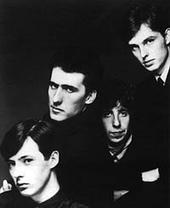Orchestral Manoeuvres in the Dark (often abbreviated to OMD) were a synth pop group from the Wirral, UK, who recorded for Virgin Records (originally for Virgin’s DinDisc subsidiary).
The group was founded by Andy McCluskey and Paul Humphreys, and they formed the core of the outfit until 1989, when the group split. McCluskey then retained the name and continued to record and tour as OMD with a new line-up.
In late December 2005, OMD’s official website announced a 2006 reformation, for both live performances and a new album, with rehearsals beginning in summer 2006. The planned line up will feature the original 1980’s members.
Early history
As teenagers, Humphreys and McCluskey were involved in several unsigned Wirral bands, including Equinox, Pegasus, and the short-lived Hitlerz Underpantz. McCluskey would usually sing and play bass guitar, whilst electronics enthusiast Humphreys initially began as a roadie, graduating to keyboards. The pair shared a love of electronic music, particularly Brian Eno and Kraftwerk.
By 1977, McCluskey & Humphreys put together seven-piece (three singers, two guitarists, bassist, drummer, and keyboard player) Wirral ’supergroup’ The Id, whose line-up included drummer Malcolm Holmes and McCluskey’s girlfriend Julia Kneale on vocals. The group began to gig regularly in the Merseyside area, performing original material (largely written by McCluskey & Humphreys). They had quite a following on the scene, and one of their tracks (Julia’s Song) was included on a compilation record of local bands called Street to Street. Meanwhile Humphreys & McCluskey collaborated on a side-project called VCL XI (named after a valve from the diagram on the cover of Kraftwerk’s Radio-Activity album), where they pursued their more bizarre electronic experiments, often working with tape collages, home-made kit-built synthesisers, and circuit-bent radios.
In 1978, The Id split due to the traditional musical differences. McCluskey briefly sang with electronic Wirral quartet Dalek I Love You. However, he eventually rejoined Humphreys, and their VCL XI project was renamed Orchestral Manoeuvres in the Dark. They began to gig regularly as a duo, performing to backing tracks played from a Revox tape-recorder they christened "Winston" (after the antihero of George Orwell’s novel Nineteen Eighty-four). Finding themselves on the cusp of an electronic new wave in British pop-music, they released a one-off single, "Electricity", with celebrated independent label Factory Records (the single sleeve was designed by Peter Saville, whose distinctive graphics provided OMD’s public image well into the mid-80s), and were then quickly snapped up by Virgin subsidiary DinDisc.
